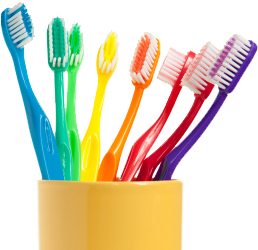FAQ's
Why should my child see a pediatric dentist instead of our regular family dentist? When?
Pediatric dentistry is a dental specialty that focuses on the oral health of young people. Following dental school, a pediatric dentist has 2 or 3 years of additional specialty training in the unique needs of infants, children and adolescents, including those with special health needs. The American Academy of Pediatric Dentistry and The American Academy of Pediatrics jointly recommend that every child receive a dental check up by their first birthday.
Won’t the baby teeth fall out anyway? Why are they important?
Baby molars, on average, are replaced between the ages of 9 and 12. Early tooth loss caused by dental decay can result in difficulty chewing, failure to thrive, impaired speech development and reduced self esteem. Neglect of the baby teeth can result in severe pain and serious infection of the gums and jaws which can in turn seriously affect a child’s general health, as well as damage their developing permanent teeth.
How do I brush and floss my uncooperative child?
It is normal for children between the ages of 1-3 to show some resistance to brushing and flossing. Allowing your child to watch you brush helps. It may be helpful to have your child lay down on a flat surface such as bed or floor while you brush and floss their teeth. Always use a soft toothbrush and avoid flouride toothpaste until a child learns to spit out correctly (usually around the age of 3). Keep in mind that you are doing what is best for them and helping to prevent dental problems down the road.
How often should I bring my child in for check ups and cleanings?
For most children, we recommend every six months… just like adults! Some of our patients come in more frequently for cleanings and check ups. These may be children who are more cavity-prone, have braces, or have a tendency to build up tartar more quickly.
If you have more questions, please visit aapd.org.

